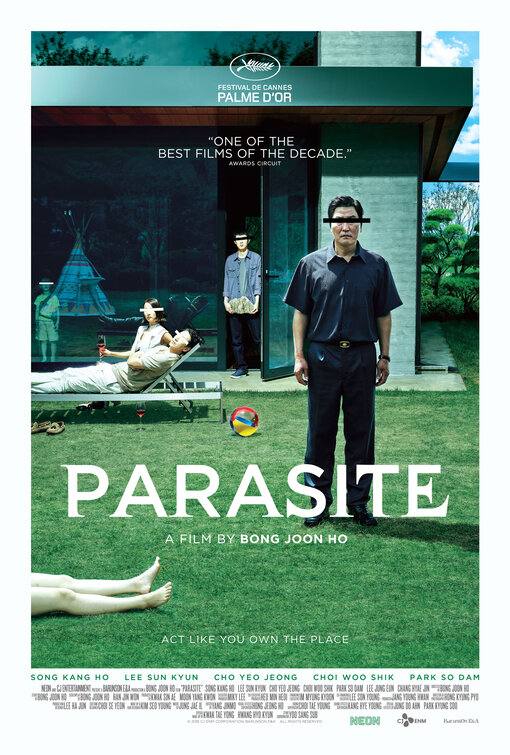Parasite Makes Worthy Run for Best Picture Academy Award
If a subtitled foreign film has a shot at winning Best Picture at the Academy Awards, Parasite might be the one to do it. The dark comedy by acclaimed South Korean director Bong Joon-ho is well-scripted, universally well-acted, and carries a thought-provoking message about inequality, human dignity, and social justice.
Parasite is told from the point of view of the Kims, a Korean family of four living in a basement apartment in a poor section of a big (unnamed) Korean city. They are so poor the family scrambles for scraps of food to eat. Their father Ki-taek (Song Kang-ho) formerly worked as a driver but is now unemployed. The rest of the family, including their son, Ki-woo (Choi Woo-shik), works odd jobs trying to make ends meet.
When Ki-woo’s best friend leaves to study abroad in the United States, he suggests Ki-woo apply for his former job as an English tutor to the daughter of a rich Korean family. Even though Ki-woo was unable to go to university, he is proficient in English. He doubts the family will hire him if they know he is poor. But the job pays well, and his friend will give him a recommendation to the girl’s mother.
Ki-woo lands the job after presenting himself falsely as a university student. He begins teaching English to the daughter under the watchful eye of Mrs. Park (Cho Yeo-jeong). Mrs. Park’s naive trust means Ki-woo steps into the role of a trusted employee of the household. The rest of Ki-woo’s family quickly begins scheming to find jobs for the rest of his family. Ki-woo recommends his sister as an “art therapist” who can help Mrs. Park’s son, who is obsessed with dark art because of nightmares. Their conniving then leads the Parks to hire their father, Ki-taek, as a personal driver, and their mother, Chung-sook (Chang Hyae-jin), as a housekeeper, unaware that the Kims are all related to each other. The Kims find themselves all under the same roof, enjoying the perks of an upper-middle-income lifestyle in Korea.
The tension builds as the Kim family further ingratiates itself into the Park family, their trust built on a web of falsehoods and scheming. The question then becomes when, and how, the house of cards will fall apart.
At first, Boon Joon-ho’s script seems predictable. The “parasites,” so it seems, are pretty clear. The Kims appear to be living off the Park’s wealth, providing little benefit to the Park family since their services are based on lies. But the story begins to turn as the focus shifts to the wealthy Parks and the way they treat the Kims. As the Kims become more familiar with their employers, the Parks make it clear that they are employees. There are lines they cannot cross.
The Kims’ contrivances work because of Mrs. Park’s gullibility. But the Parks are also entitled by their wealth. They hire the Kims (and others) to do the work they believe is beneath them or simply don’t want to do. The Kims, as servants, soon find that their path to wealth seems hollow. In this more subtle way, Parasite explores an underbelly of some Asian cultures (albeit in varying degrees), one which projects a supportive communal bond among all members of society but is superficial and susceptible to self-centered behavior and egoism.
While Parasite is very much in the genre of dark comedy, Boon Joon-ho choreographs the final third of the film in moving and thought-provoking ways. Parasite includes a number of different layers and plot twists that keep the story moving forward. These twists engage the audience, spice up the comedy, and creates the momentum of a thriller. As multiple worlds collide, the consequences of the Kims machinations begin to bear fruit. The ironies and contradictions become apparent to everyone but the characters in the film.
The buzz leading into the 92nd Annual Academy Awards is that Parasite might be the first foreign language film to break English language barrier for Best Picture. It’s already garnered a host of major awards, including the first non-English language film to win the Screen Actors Guild’s award for Outstanding Performance by a Cast in a Motion Picture. Indeed, if it takes home an Oscar, Parasite and Bong Joon-ho and the cast will have earned it.
Parasite has been nominated in the following categories for the 2020 Academy Awards:
- Best Director
- Best Picture
- Best Original Screenplay
- Best Film Editing
- Best International Feature Film
- Best Production Design


















